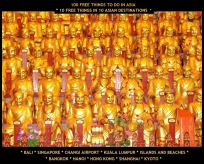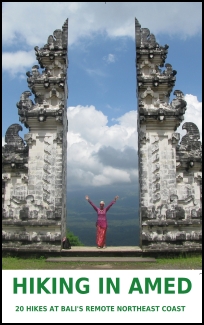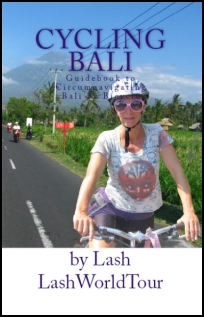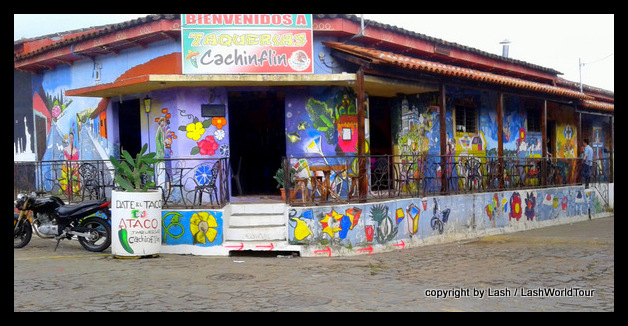
colorful murals in Ataco – Ruta de Flores – El Salvador
Ruta de Flores – El Salvador
The Ruta de Flores (Route of Flowers) in western El Salvador, close to the border of Guatemala, is one of the country’s most famous and popular destinations. It consists of a series of outdoor attractions and small mountain towns along 36 km / 20 miles of windy, twisting mountain road running between Ahuachapan in the north and Sonsonate at the southern end.
Each town has its own character and special attractions. In addition, there are visits to coffee plantations, hikes to waterfalls and lakes, soaks in hot springs, dining options at big roadside outdoor restaurants set in lush gardens, and the famous weekend food festival, which is held every single weekend in Juayua town.
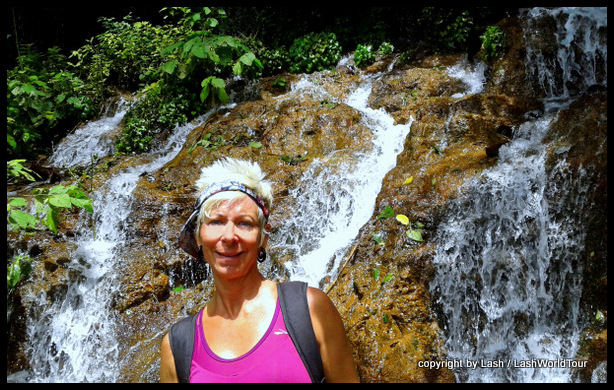
enjoying waterfalls – 7 WF tour
This is an important coffee growing region, so every town has a surprising number of cute cafes serving gourmet coffee and espresso options. Visitors can also tour coffee plantations to learn the processes of growing, harvesting and producing world-class coffee.
Salvadoreans from the capital flock to Ruta de Flores on weekends and many international travelers add it to their country itineraries.
There are regular public buses running between all the towns, distances are very short, and bus fares are incredibly cheap. It only costs 25-75 cents US from one town to another. (btw, El Salvadoreans only use US currency, as the ‘colon’ was made more or less obsolete by the government in 2001)
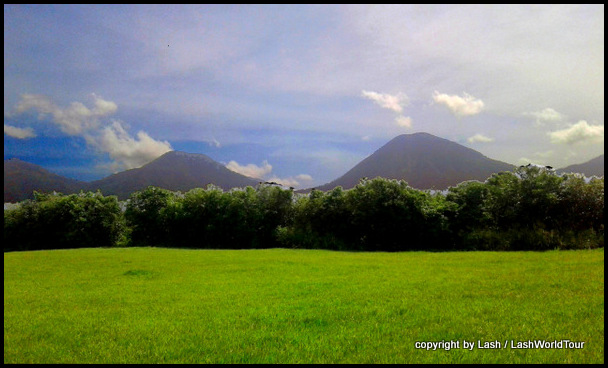
volcano view on 7 Waterfalls Hike – El Salvador
Visitors could easily base themselves in one town or other and explore everything of interest from there. Best bases are Juayua, Ataco or Ahuachapan.
Aside from scenic views along the entire length of the pretty mountain road, most attractions and noteworthy towns are located at the northern end of the route, between Juayua and Ahuachapan.
Sonsonate city at the southern end is basically just a big transport hub and is also home to some of El Salvador’s most notorious drug gangs, so it’s probably best to just pass on through rather than staying the night there. Don’t worry, you’ll be fine during the daytime and riding buses through!
Here are the main towns and the attractions to be enjoyed along the Ruta de Flores:
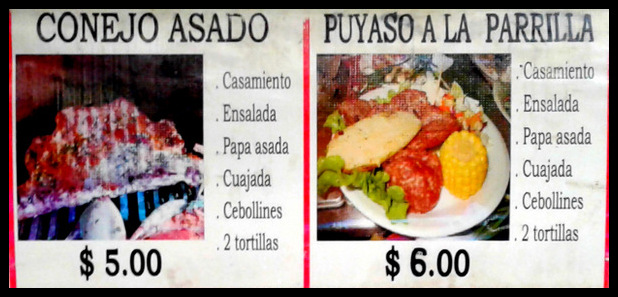
menu at weekend food festival – Juayua – Ruta de Flores – El Salvador
Juayua
Situated in the middle of the Ruta de Flores, 26 km / 16 miles south of Ahuachapan, Juayua is one of the principal attractions in this region, particularly due to its popular food festival on Saturdays and Sundays.
There used to be an abundance of exotic dishes like guinea pig, boa and lizard, but those are no longer permitted since the animals are all on the endangered list. That’s very good for the animals!
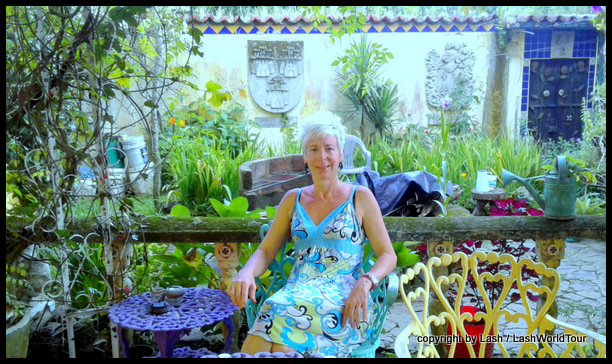
relaxing in garden of Hostel Mazeta – El Salvador
Nowadays, the most exotic dishes include rabbit and a type of sheep referred to as ‘wool-less dwarf sheep’. There are also plenty of local Salvadorean specialties like yuca and ‘crazy corn’, which is a cob of corn smothered in mayonnaise, mustard and ketchup. Hmmm…
Juayua is also becoming noteworthy for its great budget accommodation option, Casa Mazeta, and for their great guided 7 Waterfalls Trips. Other tours can also be arranged, including summits of nearby volcanoes, trips to hot springs and visits to coffee plantations.
Aside from these attractions, there’s nothing much to write home about over Juayua town. It has a small leafy main plaza and an attractive but rather plain white cathedral. Otherwise, it’s just a little Salvadorean town. Peaceful, quiet and nondescript.
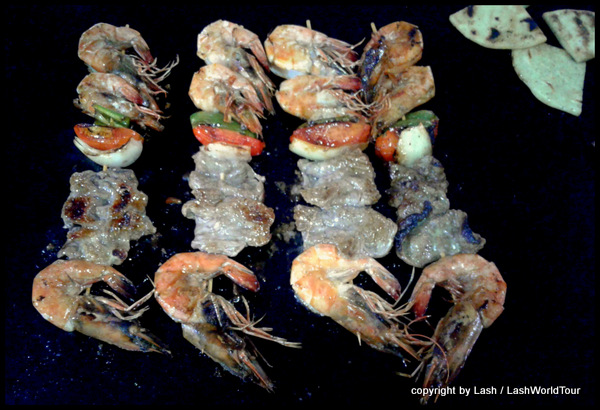
surf n turf at Juayua food festival – El Salvador
Highlights of Juayua:
Food Festival every Saturday and Sunday, with live music
Hostel Mazeta budget accommodation
Tour of 7 waterfalls
Los Chorros waterfalls just outside town
Pupuseria Emeralda – famous pupusa restaurant in El Salvador
Great base to explore nearby towns and attractions
Apaneca
This is the next town north of Juayua. It doesn’t have too much noteworthy either, in terns of the town itself. But it’s the base for walking to two nearby lakes, each about a 2-hour round trip hike.
Highlights of Apaneca:
Hike to two nearby lakes: Laguna de las Nymphas and Laguna Verde
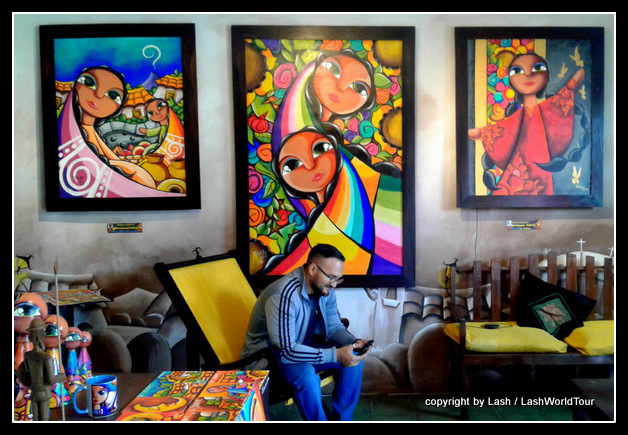
Art gallery — Ataco – El Salvador
Ataco
This is the most upscale, colorful and happening town on the Ruta de Flores. It has a fairly large main plaza full of shady trees and benches for relaxing and people watching.
The plaza is surrounded by a whole series of rather upscale cafes, restaurants, art galleries and boutiques. Several well-known Salvadorean artists have their studios/galleries there.
Many large colorful murals paint the walls of various restaurants, shops and buildings around town. Take a stroll to check them all out.
Ataco also now has its own weekend food festival. Though smaller in scale than the one at Jauyua, there seems to be more variety of food on offer. It’s also a lot less crammed with people, probably due to the many great restaurants surrounding the plaza and the fame of Juyua’s food festival.
There are a few churches to explore and a short hike up to a big cross on a hillside overlooking town, with great views of Ataco and distant mountains, forests and volcanoes.
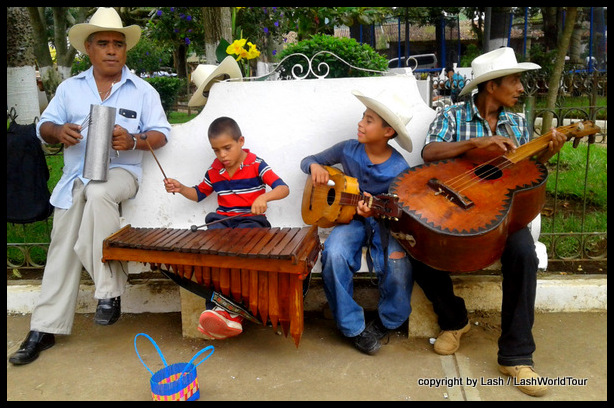
local musicians at Ataco main plaza – Ruta de Flores
Highlights of Ataco:
Art galleries/studios of prominent Salvadorean artists
Colorful murals
Upscale restaurants and cafes
Particularly famous for coffee
Boutiques and specialty shops
Weekend food festival, live music and shopping
Hillside cross with panoramic views
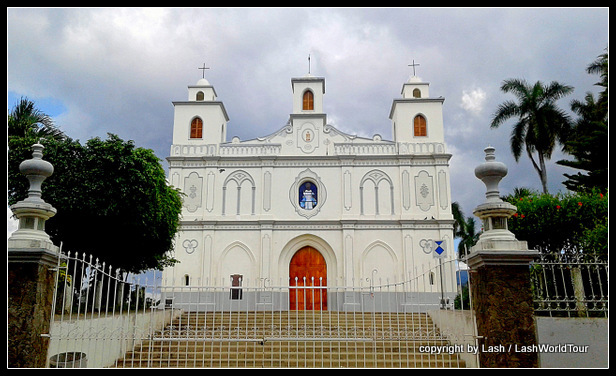
Historic church in Ahuachapan = El Salvedor
Ahuachapan
This is the northernmost town on the Ruta de Flores and the area’s biggest city. It has a large leafy main plaza, an notable historic church and a handful of colonial buildings surrounding the plaza and smattering around town. On the edge of town are several geysers spewing steam up into the air. The region’s hot springs are closest to Ahuacapan.
Highlights of Ahuachapan:
steam geysers on the edge of town
large leafy central plaza
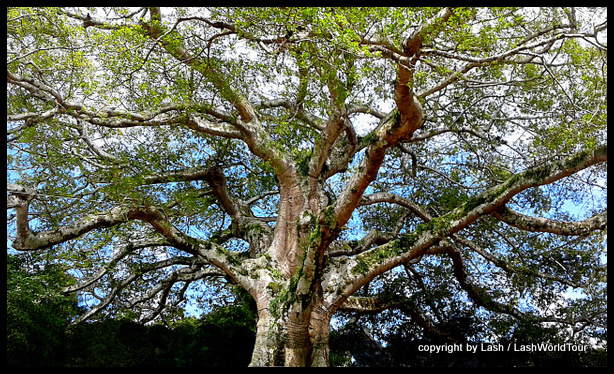
300-year old Ceiba Tree – Ruta de Flores
Salcoatitan
This tiny town is situated just a few km south of Juayua. Again, there’s not much to the town itself, but it does have several worthwhile attractions. Number one is the massive 300-year-old Ceiba tree growing on the southern edge of town. The town has several little cafes serving Salvador’s famous coffee.
Salcoatitan is most famous for its quesadillas. In Mexico and Guatemala, quesadillas are a main dish of tortilla filled with chees and possibly other ingredients. But in Salvador a quesadilla is a kind of cheese cake that most resembles cheese-flavored pound cake.
There’s also a historically famous colonial church in town, but it’s also fairly plain as colonial churches in the Americas go. And a few murals and tile mosaics brighten up several buildings around town.
Highlights of Salcoatitan:
300-year-old Ceiba tree
famous quesadillas, a kind of cheese cake/bread
weekend food shops and live music
colorful murals
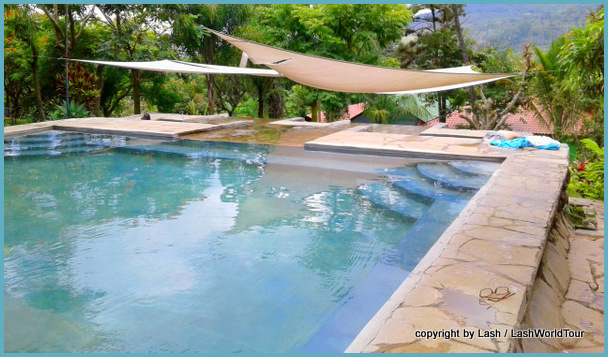
hot springs near Ahuachapan – Ruta de Flores – El Salvador
Other Attractions on Ruta de Flores:
Hot Springs, located between Ahuachapan and Ataco
Outdoor restaurant/cafes in lush gardens along the road between Ataco and Apaneca
Coffee plantations
Two lakes accessed from Apaneca
More distant tours to volcano hikes, mountains and lakes
==================================================
You might also find the following articles useful:
My Plan for Travel in El Salvador
My Travel Itinerary for Central America
===============================================================

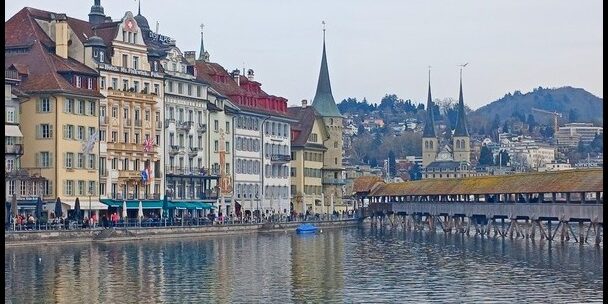
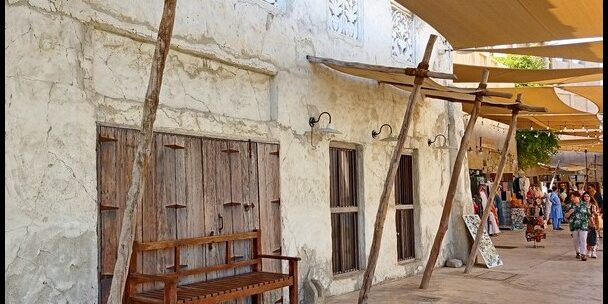
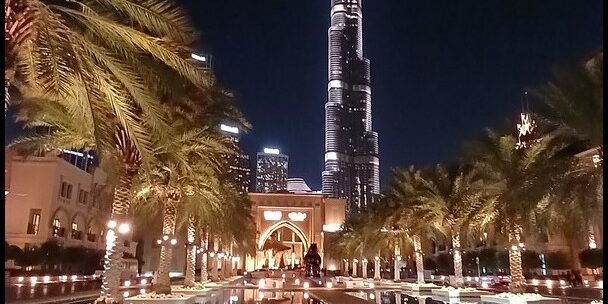
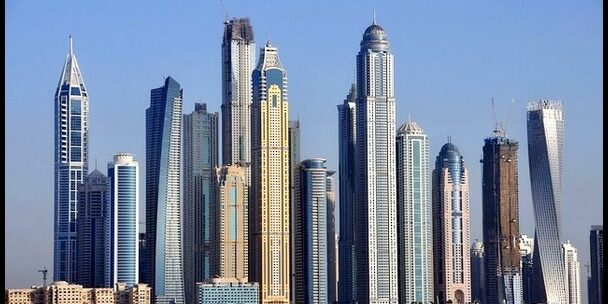
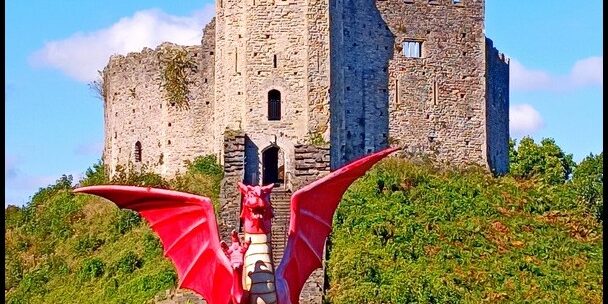

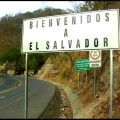
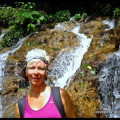
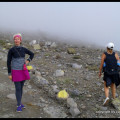
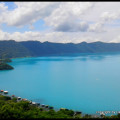

 Hi! I'm Lash, an American nomadic world traveler who's been traveling solo since 1998. I’m passionate about traveling the world nomadically and then sharing it all with you. I hope to inspire you to travel the world, to entertain you with tales from the road, and to help you reach your travel dreams. Welcome!
Hi! I'm Lash, an American nomadic world traveler who's been traveling solo since 1998. I’m passionate about traveling the world nomadically and then sharing it all with you. I hope to inspire you to travel the world, to entertain you with tales from the road, and to help you reach your travel dreams. Welcome! 